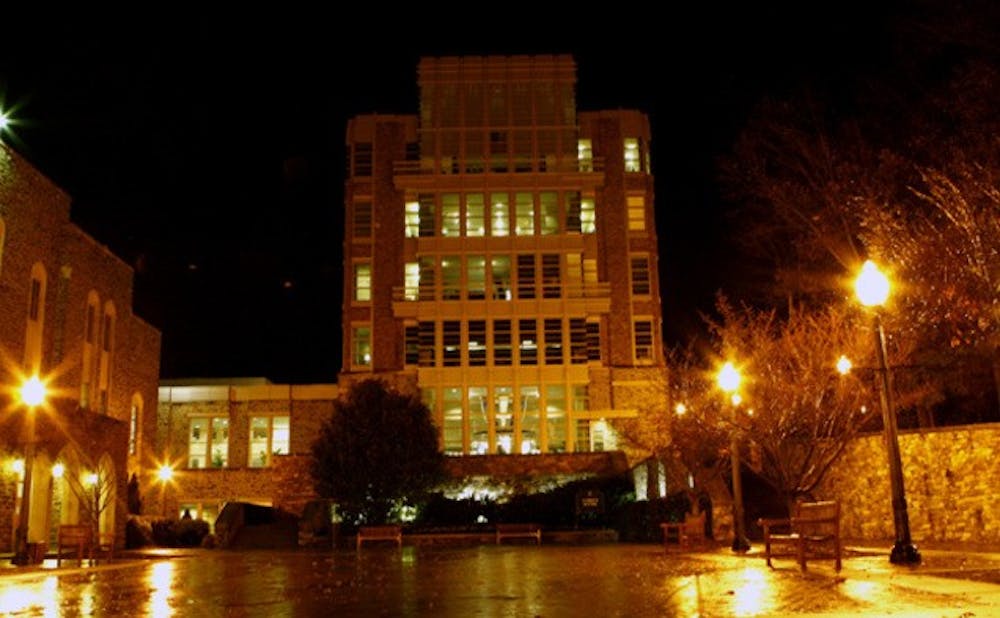Duke's student-athletes rank at the top of the NCAA class in terms of academic performance—and the University is looking to keep it that way.
Lee Baker, dean of academic affairs for the Trinity College of Arts and Sciences, outlined "mitigation strategies for academic irregularities" of student-athletes to the Arts and Sciences Council Thursday. In light of the recent scandal at the University of North Carolina at Chapel Hill, he noted, it is more apparent than ever how easy it can be for members of an institution to compromise academics for athletics.
"It keeps me up," Baker said. "We're so, so proud of our student-athletes—10 percent of our students are recruited varsity athletes. It takes one, two cases and that whole reputation could unwind quickly."
The academic performance of Duke's student-athletes—measured by graduation rates and grade-point averages, among other data—ranks with the very best in the nation, Baker said. But ensuring the integrity of the system is key. In recent years, Duke has analyzed the enrollment patterns of student-athletes to make sure that nothing is awry.
After the drop-add period ends each semester, classes with more than 50 percent athlete enrollment are flagged and examined, Baker said. Only once has the University seen the need to cancel a class based on such an investigation.
Enrollment patterns are also regularly assessed for courses that steadily draw disproportionate numbers of student-athletes. The only courses that have been found to fit this bill are Spanish and introductory calculus—neither of which raise red flags for administrators, Baker said.
Another key area of focus is the academic integrity of independent studies, Baker added. One of the more damning aspects of the UNC scandal was the discovery of independent study courses that demanded little or no work but gave high grades.
"Well before this became an issue at UNC.... I said, if there's going to be a soft spot at Duke, it's going to be independent studies," Baker noted.
Approximately five years ago, administrators began analyzing the number of student-athletes that individual faculty members enrolled in independent studies. Faculty members with high numbers of athletes tended to be those with generally high numbers of independent study students, Baker said—with nothing to suggest impropriety.
But ensuring that the system stays that way requires faith in the faculty and the directors of undergraduate studies to treat an athlete as the would any other student, Baker noted.
"It's built on trust," Baker said. "A DUS could do stuff we don't necessarily catch."
Brad Berndt, senior associate director of athletics and student services, noted the importance of collaboration between athletic and academic administrators—with both sides working to uphold the integrity of the system.
"We've got to be trusting of each other," Berndt said. "It can't be 'we' over in athletics and 'you' on the other side of Towerview Drive. That doesn't work."
Laurie Patton, dean of the Trinity College of Arts and Sciences, noted the level of cooperation between athletics and the College—citing in particular instances in which student-athletes are found responsible of violating the student code of conduct. Though athletic and academic administrators do not always initially see eye-to-eye on appropriate disciplinary action, the department of athletics consistently respects the academic mission of the University, she said.
"In each case where athletics had disagreed with where we wanted to go—some of the sanctions are very tough, expulsion, suspension, et cetera, which directly affect income in revenue sports—not only have we not gotten pushback from athletics, but we've gotten enforcement of our sanctions without another word," Patton said.
Though Duke has traditionally been successful in upholding the integrity of the student-athlete system, the University is far from immune from the possibility of scandal, Baker noted. Ensuring that Duke avoids NCAA academic infractions requires ethical action not only from the administration, but from faculty and student-athletes as well.
"Could it happen here? Absolutely," Baker said of a situation like the one that occurred at UNC. "This is my best attempt to mitigate it."
In other business:
The Plagiarism Sanctions Review Committee presented a series of recommended changes to Duke's treatment of academic dishonesty. In order to ensure that Duke is consistently fair in handling plagiarism, the committee recommended that faculty be educated on their responsibility to report dishonesty and that more be done to show students the consequences of academic misconduct.
Get The Chronicle straight to your inbox
Signup for our weekly newsletter. Cancel at any time.

